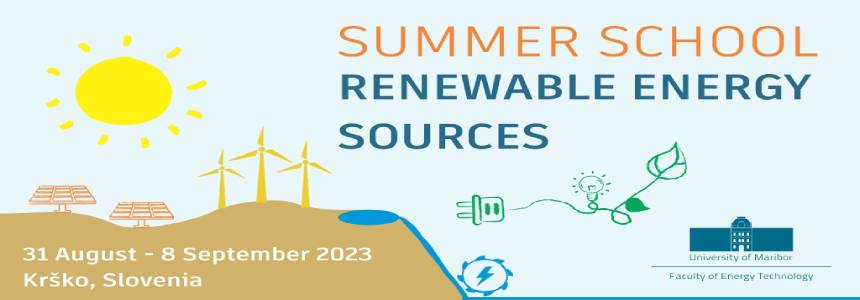SUMMER SCHOOLS
RENEWABLE ENERGY SOURCES 2023

The summer school was organised as a Blended Intensive programme (BIP) with a physical and a virtual part.
Virtual part
The virtual part took place with the help of the software tool Ms Teams. As part of the virtual part, on the first day (August 31, 2023), after the introductory greeting and presentation of the Faculty of Energy of University of Maribor, the students listened to a lecture entitled “The role of renewables in the power grid and how to live with them”, which was given by Prof. dr. Peter Bracinik from the Faculty of Electrical Engineering and Information Technology, University of Žilina, Slovakia. On the second day of virtual work (September 1, 2023), Prof. dr. Peter Bajor from the University of Dunaújváros, Hungary gave two lectures entitled “Integration of renewable energy sources via low-cost demand-driven solutions in energy systems” and “The possible roles of electric vehicles in balancing power systems”. The afternoon was devoted to geothermal energy, where prof. dr. Jurij Avsec presented the basic theory related to geothermal energy and as well its possibilities in the world, Europe and Slovenia. Then, based on the presented theory of geothermal energy, assistant Urška Novosel solved practical cases with the students.
Physical part
The main objectives of the summer school are:
- to enable students to understand the field of photovoltaic systems, the main parts of which are the solar module and the inverter;
- to provide basic knowledge about photovoltaic systems;
- to train the student for independent handling of solar modules, inverters, and placements of photovoltaic systems;
- to acquaint students with the trends in the field of hydrogen and methanol technologies and to show them the application of hydrogen technologies in engineering practice;
- to introduce students the fundamentals of heat transfer and heating and cooling systems;
- to show physical models and thermodynamic calculations for the calculation of heat and mass exchangers;
- to provide basic knowledge in the field of hydropower and windpower systems;
- to introduce students to the basic knowledge in the field of pump and compressor systems;
- to understand the basic operation of wind turbines;
- wind turbine characteristic measurement;
- find out what line losses are and how they are calculated;
- measurement of line losses on a given pipe;
understand the basic operation of hydraulic shock.
KIP methods and results
The main methods of the summer school are:
- Lectures (students learn the theoretical foundations of the field)
- Tutorial (performing calculation cases)
- Laboratory exercises (students consolidate theoretical knowledge on practical examples and learns about applicability).
The main results of the summer school are:
- students are able to identify, describe and explain the operation of photovoltaic systems and their components;
- students learn the basic methods and physical principles connected with hydrogen technologies;
- students understand and solve some problems related to hydrogen technologies;
- students learn basic methods and physical principles in modern thermodynamics and understand and solve some problems related to thermodynamics and heat transfer;
- students apply methods of thermodynamics in energy practice;
- students describe the basic principles of placing the hydropower and wind power systems in the environment;
- students are acquainted with the management-operation of the hydropower system parameters;
- students understand the basic principles of placing the pump and compressor system (in powerhouse);
- students learn about the operation of wind turbines and about the process of measuring the characteristics of wind turbines;
- students learn about line losses and the process of calculation and experimental measurements;
- students learn about hydraulic impact.









